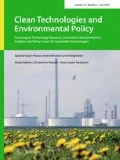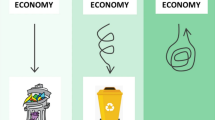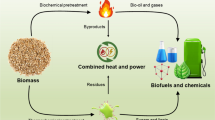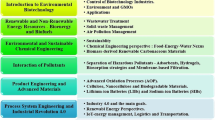Abstract
Life cycle assessment (LCA) is a tool that aids in sustainable decision-making among product and process alternatives. When implementing LCA, the efficient and accurate modeling of chemical processes for life cycle inventory (LCI) generation is still challenging. Challenges include a lack of systematic design and simulation tools and approaches to develop chemical process models for obtaining and analyzing more realistic LCI results. In this contribution, a novel process systems framework is proposed for estimating LCI results when implementing pollution control technologies. This framework involves the development and incorporation of pollution control unit (PCU) modules into process simulation and generation of LCI data associated with the PCUs for use in a sustainability evaluation. Different pollution control modules are designed for rapid LCI estimation and applied to obtain emissions, utility consumption, material, and land footprint results related to waste streams of a process simulation. Then, the LCI results are analyzed with the objectives of minimizing the environmental impact and utility consumption. The proposed framework is illustrated via a biomass/coal gasification process for syngas production with the end goal of acetic acid manufacturing. Results associated with this case study show that the developed framework can provide guidelines for sustainable decision-making based on generated LCI results.









Similar content being viewed by others
References
AspenTech (2017) Aspen Hysys 8.4. http://www.aspentech.com/products/aspen-hysys/. Accessed 18 April 2017
Bhatt A, Zhang Y, Davis R et al (2016) Economic implications of incorporating emission controls to mitigate air pollutants emitted from a modeled hydrocarbon-fuel biorefinery in the United States. Biofuels Bioprod Biorefin 10:603–622. https://doi.org/10.1002/bbb.1666
Bojarski AD, Guillén-Gosálbez G, Jiménez L et al (2008) Life cycle assessment coupled with process simulation under uncertainty for reduced environmental impact: application to phosphoric acid production. Ind Eng Chem Res 47:8286–8300. https://doi.org/10.1021/ie8001149
Bretz R, Frankhauser P (1996) Screening LCA for large numbers of products. Int J Life Cycle Assess 1:139–146. https://doi.org/10.1007/BF02978941
Cashman SA, Meyer DE, Edelen AN et al (2016) Mining available data from the United States Environmental Protection Agency to support rapid life cycle inventory modeling of chemical manufacturing. Environ Sci Technol 50:9013–9025. https://doi.org/10.1021/acs.est.6b02160
Chemstations (2016) ChemCAD 7.0. http://www.chemstations.com/. Accessed 10 Oct 2016
Cheung H, Tanke RS, Torrence PG (2001) Acetic acid. In: Hawkins S, Russey W (eds) Ullmann’s encyclopedia of industrial chemistry. Wiley, Deerfield Beach, pp 209–237
Eberle A, Bhatt A, Zhang Y, Heath G (2017) Potential air pollutant emissions and permitting classifications for two biorefinery process designs in the United States. Environ Sci Technol 51:5879–5888. https://doi.org/10.1021/acs.est.7b00229
Fout T, Zoelle A, Keairns D et al (2015) Cost and performance baseline for fossil energy plants. Volume 1b: Bituminous coal (IGCC) to electricity. DOE/NETL report. https://www.netl.doe.gov/research/energy-analysis/search-publications/vuedetails?id=1033. Accessed 24 April 2018
Freeman H, Harten T, Springer J et al (1992) Industrial pollution prevention: a critical review. J Air Waste Manag Assoc 42:618–656. https://doi.org/10.1080/10473289.1992.10467016
Geisler G, Hofstetter TB, Hungerbühler K (2004) Production of fine and speciality chemicals: procedure for the estimation of LCIs. Int J Life Cycle Assess 9:101–113. https://doi.org/10.1007/BF02978569
Ghassemi A (ed) (2001) Handbook of pollution control and waste minimization. CRC Press, Boca Raton
Guinée JB, Heijungs R, Huppes G et al (2011) Life cycle assessment: past, present, and future. Environ Sci Technol 45:90–96. https://doi.org/10.1021/es101316v
Heijungs R, Suh S (2006) Reformulation of matrix-based LCI: from product balance to process balance. J Clean Prod 14:47–51. https://doi.org/10.1016/j.jclepro.2005.05.022
Hellweg S, Canals LM (2014) Emerging approaches, challenges and opportunities in life cycle assessment. Science 344:1109–1113
Hischier R, Hellweg S, Capello C, Primas A (2005) Establishing life cycle inventories of chemicals based on differing data availability (9 pp). Int J Life Cycle Assess 10:59–67. https://doi.org/10.1065/lca2004.10.181.7
Jiménez-González C, Kim S, Overcash MR (2000) Methodology for developing gate-to-gate life cycle inventory information. Int J Life Cycle Assess 5:153–159. https://doi.org/10.1007/BF02978615
Kiruchi Y, Mayumi K, Hirao M (2010) Integration of CAPE and LCA tools in environmentally-conscious process design: a case study on biomass-derived resin. In: Pierucci S, Ferraris GB (eds) 20th European symposium on computer aided process engineering—ESCAPE20. Elsevier, New York, pp 1051–1056
Li S, Mirlekar G, Ruiz-Mercado G, Lima F (2016) Development of chemical process design and control for sustainability. Processes 4:23. https://doi.org/10.3390/pr4030023
Lima FV, Li S, Mirlekar GV et al (2016) Modeling and advanced control for sustainable process systems. In: Ruiz-Mercado G, Cabezas H (eds) Sustainability in the design, synthesis and analysis of chemical engineering processes. Elsevier, Oxford, pp 115–138
Ling-Chin J, Heidrich O, Roskilly AP (2016) Life cycle assessment (LCA)—from analysing methodology development to introducing an LCA framework for marine photovoltaic (PV) systems. Renew Sustain Energy Rev 59:352–378. https://doi.org/10.1016/j.rser.2015.12.058
Morales-Mendoza LF, Azzaro-Pantel C (2017) Bridging LCA data gaps by use of process simulation for energy generation. Clean Technol Environ Policy 19:1535–1546. https://doi.org/10.1007/s10098-017-1349-6
National Renewable Energy Laboratory U.S. Life Cycle Inventory Database. https://www.lcacommons.gov/nrel/search. Accessed 22 Aug 2017
NGC+ Interchangeability Work Group (2005) White paper on natural gas interchangeability and non-combustion end use. https://www.ferc.gov/eventcalendar/Files/20050316082958-interchangeability.pdf. Accessed 22 Aug 2017
Peters MS, Timmerhaus KD, West RE (2003) Plant design and economics for chemical engineers. McGraw-Hill, New York
Petrescu L, Fermeglia M, Cormos C-C (2016) Life cycle analysis applied to acrylic acid production process with different fuels for steam generation. J Clean Prod 133:294–303. https://doi.org/10.1016/j.jclepro.2016.05.088
Robinson PJ (2011) Dynamic modeling and plantwide control of a hybrid power and chemical plant: an integrated gasification combined cycle coupled with a methanol plant. PhD thesis. Lehigh University
Robinson PJ, Luyben WL (2008) Simple dynamic gasifier model that runs in aspen dynamics. Ind Eng Chem Res 47:7784–7792
Scates MO, Trueba DA (2007) Process for producing acetic acid. United States Patent No. 7208624
Smith RL, Ruiz-Mercado G, Meyer DE et al (2017) Coupling computer-aided process simulation and estimations of emissions and land use for rapid life cycle inventory modeling. ACS Sustain Chem Eng 5:3786–3794. https://doi.org/10.1021/acssuschemeng.6b02724
Stone DK, Lynch SK, Pandullo RF et al (1992) Flares. Part I: Flaring technologies for controlling VOC-containing waste streams. J Air Waste Manag Assoc 42:333–340. https://doi.org/10.1080/10473289.1992.10466996
Subramanian V, Golden JS (2016) Patching life cycle inventory (LCI) data gaps through expert elicitation: case study of laundry detergents. J Clean Prod 115:354–361. https://doi.org/10.1016/j.jclepro.2015.11.098
Sugiyama H, Fischer U, Hungerbühler K, Hirao M (2008) Decision framework for chemical process design including different stages of environmental, health, and safety assessment. AIChE J 54:1037–1053. https://doi.org/10.1002/aic.11430
Sunley GJ, Watson DJ (2000) High productivity methanol carbonylation catalysis using iridium. The Cativa process for the manufacture of acetic acid. Catal Today 58:293–307. https://doi.org/10.1016/S0920-5861(00)00263-7
Theodore L (2008) Air pollution control equipment calculations. Wiley, Hoboken
U.S. Environmental Protection Agency (1995) Wet scrubbers for acid gas control. https://www3.epa.gov/ttn/ecas/docs/cs5-2ch1.pdf. Accessed 30 June 2017
U.S. Environmental Protection Agency (2002) Wet scrubbers for acid gas control. https://www3.epa.gov/ttn/ecas/docs/cs5-2ch1.pdf. Accessed 20 June 2017. Accessed 10 Jan 2018
U.S Environmental Protection Agency (2002) EPA air pollution control cost manual. https://www3.epa.gov/ttncatc1/dir1/c_allchs.pdf. Accessed 30 July 2017
U.S. Environmental Protection Agency (2017a) TSCA chemical substance inventory. https://www.epa.gov/tsca-inventory/about-tsca-chemical-substance-inventory%23whatistheinventory#bonafide. Accessed 30 July 2017
U.S. Environmental Protection Agency (2017b) TSCA interim list of active substances. https://www.epa.gov/tsca-inventory/interim-list-active-substances. Accessed 18 Aug 2017
U.S. Environmental Protection Agency (2017c) Control of volatile organic compound emissions from reactor processes and distillation operations processes in the synthetic organic chemical manufacturing industry (EPA 450/3-90-016a). https://www3.epa.gov/…/199308_voc_epa450_4-91-031_reactor_distillation_socmi.pdf. Accessed 30 June 2017
U.S. Government Publishing Office (1991) Title 40: Protection of environment, Chapter I (subchapter I, part 266, subpart H): Hazardous Waste Burned in Boilers and Industrial Furnaces. https://www.ecfr.gov/cgi-bin/text-idx?SID=27dc7fde95016674672f62fcb318cf19&mc=true&node=pt40.27.266&rgn=div5#sp40.29.266.h. Accessed 19 Aug 2017
Villalba G, Ayres L, Ayres RU (2006) A proposal for emission calculations for chemical processes, Part I. Resour Conserv Recycl 48:280–299. https://doi.org/10.1016/j.resconrec.2006.01.006
Wernet G, Hellweg S, Fischer U et al (2008) Molecular-structure-based models of chemical inventories using neural networks. Environ Sci Technol 42:6717–6722. https://doi.org/10.1021/es7022362
Wernet G, Bauer C, Steubing B et al (2016) The ecoinvent database version 3 (part I): overview and methodology. Int J Life Cycle Assess 21:1218–1230. https://doi.org/10.1007/s11367-016-1087-8
Worley M, Yale J (2012) Biomass gasification technology assessment: consolidated report. http://www.nrel.gov/docs/fy13osti/57085.pdf. Accessed 28 July 2017
Yang Y, Ingwersen WW, Hawkins TR et al (2017) USEEIO: a new and transparent United States environmentally-extended input-output model. J Clean Prod 158:308–318. https://doi.org/10.1016/j.jclepro.2017.04.150
Yao Y, Masanet E (2018) Life-cycle modeling framework for generating energy and greenhouse gas emissions inventory of emerging technologies in the chemical industry. J Clean Prod 172:768–777. https://doi.org/10.1016/j.jclepro.2017.10.125
Zhu Y, Jones SB (2009) Techno-economic analysis for the thermochemical conversion of lignocellulosic biomass to ethanol via acetic acid synthesis (DOE report)
Acknowledgements
The authors gratefully acknowledge the financial support from West Virginia University and U.S. Environmental Protection Agency for the financial support through contract Ref. EP-16-C-000049. The authors are also grateful to Vitor Gazzaneo (WVU PhD Student) for the help with the scrubber simulator’s interface and calculations.
Author information
Authors and Affiliations
Corresponding author
Additional information
Disclaimer The views expressed in this contribution are those of the authors and do not represent the views or policies of the U.S. EPA. Mention of trade names, products, or services does not convey and should not be interpreted as conveying official U.S. EPA approval, endorsement, or recommendation.
Electronic supplementary material
Below is the link to the electronic supplementary material.
Rights and permissions
About this article
Cite this article
Li, S., Feliachi, Y., Agbleze, S. et al. A process systems framework for rapid generation of life cycle inventories for pollution control and sustainability evaluation. Clean Techn Environ Policy 20, 1543–1561 (2018). https://doi.org/10.1007/s10098-018-1530-6
Received:
Accepted:
Published:
Issue Date:
DOI: https://doi.org/10.1007/s10098-018-1530-6




